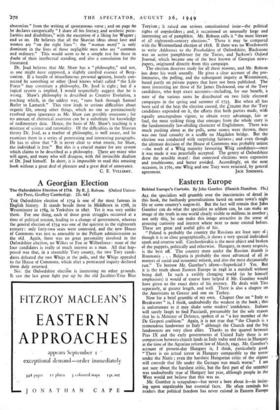A Georgian Election
TILE Oxfordshire election of 1754 is one of the most famous in English history. It stands beside those in Middlesex in 1768, in Westminster in 1784, in Yorkshire in 1807. Yet it was very unlike them. For one thing, each of those great struggles occurred at a time of political tension, leading to a change of government, whereas the general election of 1754 was one of the quietest in the eighteenth century: only forty-two seats were contested, and the new House Of Commons was just as amenable to the Pelham administration as the old. Again, there was no great personality involved in the Oxfordshire election, no Wilkes or Fox or Wilberforce: none of the four candidates is really of much interest as a man. All that hap- pened was that, in a staunchly Tory county, the two Tory candi- dates defeated the two Whigs at the polls, and the Whigs appealed to the House of Commons, which after a protracted inquiry declared them duly returned. No: the Oxfordshire electi/m is interesting on other grounds. It saw the last great fight put up by the old Jacobite-True Blue Toryism ; it raised one serious constitutional issue—the political rights of copyholders ; and it occasioned an unusually large and interesting set of pamphlets. Mr. Robson calls it " the most literate of all eighteenth-century elections." There it may be compared with the Westmorland election of 1818. If there was no Wordsworth to write Addresses to the Freeholders of Oxfordshire, Blackstone was an active pamphleteer for the Tories, and Jackson's Oxford Journal, which became one of the best known of Georgian news- papers, originated directly from this campaign. The election deserves study for all these reasons, and Mr. Robson has done his work soundly. He gives a clear account of the pre- liminaries, the polling, and the subsequent inquiry at Westminster, based partly on private papers that have not been published. The most interesting arc those of Sir James Dashwood, one of the Tory candidates, who kept exact accounts—including, for our benefit, a note of the various sums he distributed on two little electoral campaigns in the spring and summer of 1753. But when all has been said of the heat the election caused, the L20,000 that the Tory candidates expended on it, the efforts that both parties made, with equally unscrupulous vigour, to obtain every advantage, fair or foul, the most striking thing that emerges from the whole story is the fundamentally law-abiding character of Englishmen. There was much pushing about at the polls, some stones were thrown, there was one fatal casualty in a scuffle on Magdalen bridge. But the election was conducted with surprising fairness ; and even though the ultimate decision of the House of Commons was probably unjust —the work of a Whig majority favouring Whig candidates—once it was made it was peacefully accepted. The gentry of Oxfordshire drew the sensible moral: that contested elections were expensive and troublesome, and better avoided. Accordingly, on the next occasion, in 1761, one Whig and one Tory were returned, by general






























 Previous page
Previous page